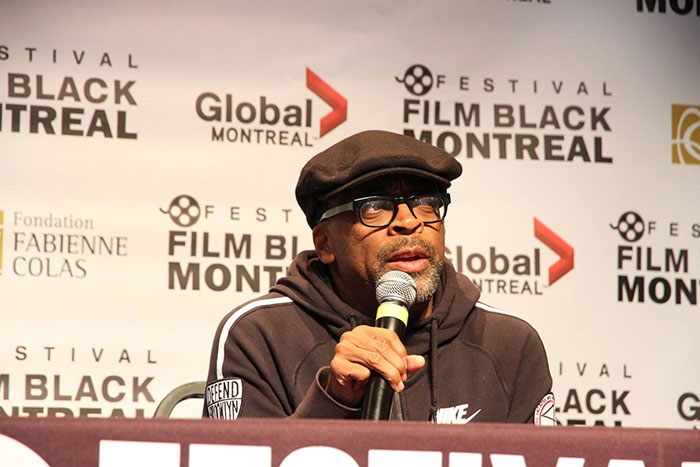Legendary director Spike Lee was at Boulevard National Wednesday afternoon as part of the 10th annual Montreal International Black Film Festival (MIBFF) to answer questions, promote his new film, and discuss the festival’s Pioneer Award—of which he’ll be the inaugural recipient.
The award, as described in a MIBFF press release, was granted “in recognition of his body of work which revolutionized the role of black talent in Hollywood, tearing away decades of stereotypes and marginalized portrayals to establish a new arena for African-American voices to be heard.” As he revealed throughout the conference, it is a project that he continues to treat as a work in progress.
As for his latest film, “Da Sweet Blood of Jesus”—which was funded through Kickstarter—Lee refused to give out much information. The film screening was a part of the festival, and he implored reporters to learn about it at the showing. He acknowledged that “it’s got a lot of blood and a lot of sex,” and that it’s “not for the squeamish,” but he wouldn’t give out any further details about the film’s content.
Despite Lee’s reluctance to discuss his latest work, he was his usual outspoken self on a number of topics including prior films, contemporary media, and the racial problems that continue to plague the U.S.
On the subject of his acclaimed 1989 film “Do the Right Thing,”—considered by many to be his magnum opus and a film which directly addresses race relations—Lee was frank about its continued relevance.
“I never thought that we would have a black president [at the time of the film’s release],” he said. “But poverty’s gotten worse. A lot of police departments see black males as a threat. Bodies have been buried this summer because of that.”
Lee had similar feelings about “Bamboozled,” his 2000 satire of race in the media, in which a television network produces and airs a contemporary minstrel show, complete with black actors wearing blackface makeup. Despite the film’s apparent liberties with the media’s depiction of race, Lee emphasized its close kinship with reality.
“I don’t think there’s anything exaggerated in there,” he said. “Look at reality TV. It’s all there.”
Lee also revealed some optimism as the press conference went on. He appeared hopeful about the future of diversity in Hollywood for the coming years. He cited a statistic saying that the U.S. population is projected to shift in its majority and minorities, then explained that it’ll inevitably lead to a diversification of the film industry.
“If you’re a business, and you don’t adapt to that, you’re in trouble,” he said.










Pingback: Médias Buzz 2014 | Festival International du Film Black de Montréal